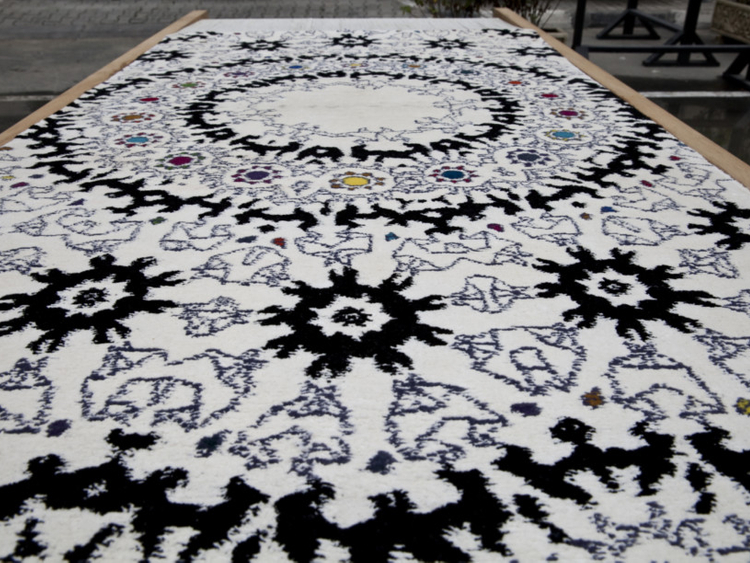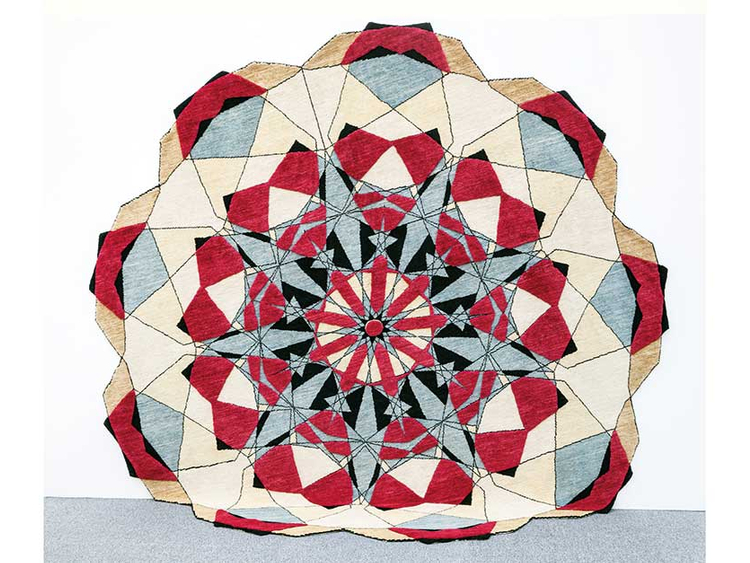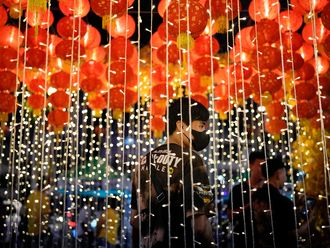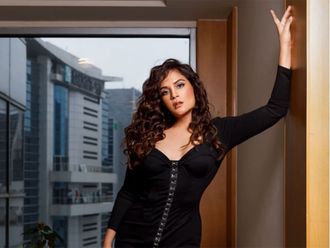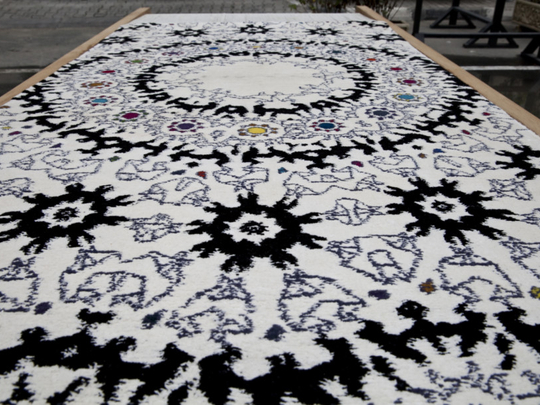
In its latest exhibition at Dubai Festival City, Artists for Change, the Fatima Bint Mohamed Bin Zayed Initiative (FBMI) is showcasing four beautiful carpets handwoven by women weavers from Afghanistan, with patterns based on designs provided by well-known Emirati artists. This unique collaboration between the underprivileged artisans and prominent artists is part of FBMI’s Artists for Change programme.
Under this programme, FBMI invited artists Wafa Hasher Al Maktoum, Mariam Khalifa Al Nahyan, Shamsa Al Abbar and Mohammed Harib to donate their artworks, which were then transformed into beautiful hand woven carpets by the Afghan weavers. The project thus provides the artisans dignified employment, a sustainable income and access to various other social services provided by FBMI, while giving the artists an opportunity to support a noble cause.
The largest yarn ball ever assembled in the region is made from pure wool and dyed with natural dyes.
Also on display at the exhibition is the largest yarn ball ever assembled in the region. The ball, which has a diameter of three metres, is made from pure indigenous wool, hand-spun by underprivileged Afghan women, and dyed with natural vegetable dyes. The huge sphere, with threads radiating out of it, filling the space around it with colour and life, represents the magic that can be created from the yarn, focusing on the essence of the carpet as if turning it inside out.
FBMI has also flown down two Afghan weavers to give live demonstrations of their art during the exhibition, daily from 4pm to midnight, and also guide visitors who want to try their hand at weaving on the traditional Afghan carpet loom.
Each artist has put a lot of thought in the designs they graciously donated to the project. Mariam Khalifa Al Nahyan is a well-known designer and the founder of MKS Jewellery. She used the GeoDove motif from her jewellery collection to develop her carpet design. The carpet based on her serene, spiritual pattern has been used to make a beautiful table.
Mariam Khalifa Al Nahyan used the GeoDove motif from her jewellery collection to develop her carpet design.
“I am delighted to have been asked to design a carpet for FBMI. I wanted to link my jewellery design to the carpet, and felt that the GeoDove which is part of my collection goes well with the initiative because of its geometric patterns and its symbolism. Doves symbolise peace, love and hope. Afghanistan has suffered a lot. What better way to combine something very symbolic with what FBMI is trying to achieve with their initiative? With the GeoDove design on the carpet, we are sending a message of love, hope and peace,” she says.
Wafa Hasher Al Maktoum is a multimedia artist and founder of FN Designs, a multi-disciplinary art gallery and design studio in Dubai. Her colourful, circular pattern incorporates many meaningful symbols.
“I am honoured and delighted to be invited to participate in this project that raises awareness about the empowerment of women in Afghanistan. The circle has always been an interesting shape for me. It represents the notions of wholeness, perfection, eternity, timelessness and infinity. I chose my geometric Camel motif for this project, working with FBMI and developing a design for the carpet. The symbol itself has been deconstructed within the mandala shape, and re-constructed anew in the final work,” she says.
Mohammed Saeed Harib is the chairman of Lammtara Art Production, and the creator of the popular animated TV series Freej, which has won him many awards. He selected a scene from Freej as his design for a carpet runner. The scene depicts the local tradition of wealthy women renting out their jewellery to women who cannot afford their own, and thereby avoiding paying Zakat.
Wafa Hasher Al Maktoum’s colourful, circular pattern incorporates many meaningful symbols.
It shows a generous mother figure showering a crowd of women with gold; but there is a twist in the tale because the women are hiding something from her. It took six weavers 360 hours to weave this complex design, with several figures and various symbols, to create the four metre by 80-centimetre runner.
Designer Shamsa Al Abbar, the founder of Shamsa Al Abbar Jewellery, is known for her unusual designs based on Arabic typography.
She donated one of her signature designs to the project. “For my collection, I took traditional Arabic calligraphy that has been an integral part of Arabic culture for thousands of years and reworked it to create something unusual and beautiful. As a graphic designer, I have always had a huge interest in typography, especially Arabic typography, which has lots of rules that have to be respected. I tried my best to follow the basic guidelines, while also adding something new to it. The whole idea behind the collection is to introduce letters as an art form. The letters are not legible, and they look like different geometric shapes put together to create a beautiful form. For this piece, I deconstructed my geometric letters and chose a powerful shape to create a pattern. I have named this shape ‘Token’, as it has slowly become a token of my brand identity. The token has also been associated with a lot of charity projects in the last few years, hence I wanted to include it in this special piece. The Token is a symbol of unity, strength, and hope,” she says.
Established in 2010, FBMI is an innovative social enterprise that harnesses the traditional skills of the Afghan people to produce beautiful hand-woven carpets, embroidered furniture and local handicrafts. The products are sourced and produced entirely in Afghanistan at FBMI’s centres in Kabul and Jalalabad, and then sold internationally through FBMI’s showrooms in the UAE, London, and soon in the USA. The carpets have also been gifted to world leaders such as Pope Francis, Barack Obama and Bill Gates.
FBMI uses the sale proceeds to pay the artisans fair market wages, provide them with training in carpet weaving and wool spinning, run clinics that provide free healthcare services to the artisans, their families, and their communities, and offer free education to their children. So far, FBMI has employed more than 3,000 Afghans, with 70 per cent of them being women, including many widows, who have been empowered to become primary breadwinners for their families.
By making full-time education of their children a mandatory requirement for artisans who want to be part of the initiative, FBMI has facilitated the enrollment of over 7,800 Afghan children in school.
“We are extremely pleased to unveil the Artists for Change programme at Dubai Festival City. FBMI aims to use this exhibition as a physical platform and forum for the community to raise awareness about Afghan women’s empowerment and to emphasise the immense support of talented Emirati artists. This exhibition reaches out to bridge the gap between international talent and underprivileged artisans in Afghanistan. FBMI extends its sincere gratitude to Dubai Festival City for all the support by teaming up as a strategic partner for this exhibition,” Farshied Jabarkhyl, regional manager, FBMI says.
Jyoti Kalsi is an arts-enthusiast based in Dubai.
Artists for Change will run at Festival Square in Dubai Festival City until June 16.



